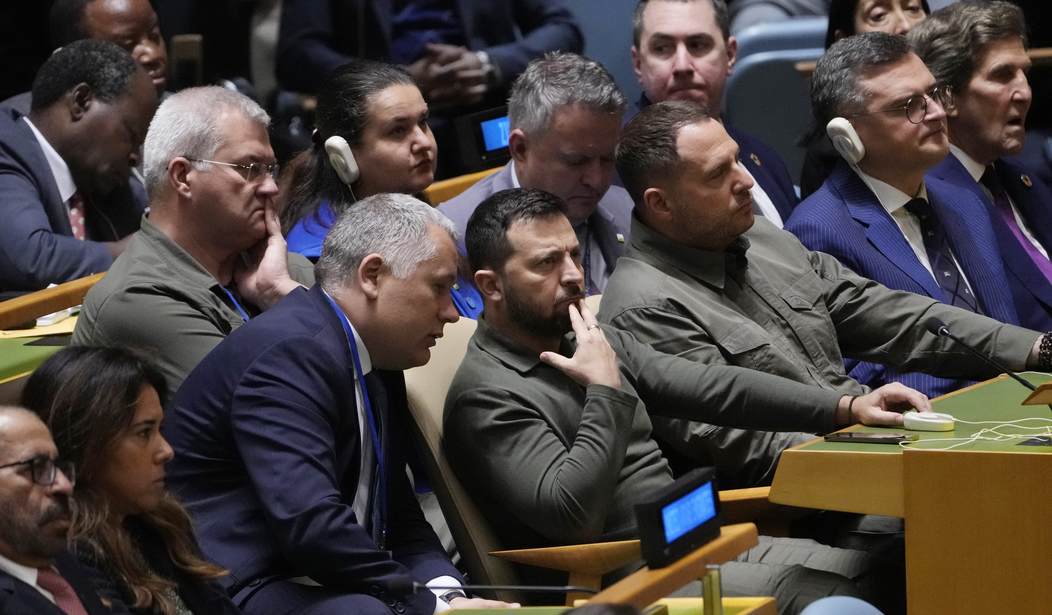With the Israeli-Hamas War taking center stage over the last month, it's understandable that the war in Ukraine would have fallen off most American's radar. We've spent $100 billion to prop up the government of Ukrainian President Volodymyr Zelenskyy, and aside from Ukraine reclaiming some territory, Kyiv has little to show for it.
Ukraine's much-ballyhooed offensive has stalled out, defeated by a sophisticated series of Russian defensive works that negated Ukraine's use of some of the West's most sophisticated weapons.
Meanwhile, an estimated 500,000 people on both sides have been killed. President Zelenskyy has issued brave statements about keeping up the fight no matter the cost, but even his most steadfast allies are beginning to ask if the cost of war hasn't already been too high.
But it's not up to the United States or any of Ukraine's allies to demand that Zelenskyy engage in peace negotiations. This is the moment that Russian President Vladimir Putin has been waiting for. He knew it was coming, which is why despite horrible casualties, Russia is still throwing men and materiel into the fight.
Putin had been gambling that the United States and NATO countries would find the enormous expense of financing Ukraine's government at war too much to bear and that Kyiv's allies would begin to pressure President Zelenskyy to work out some kind of deal with Putin to end the war.
And that's exactly what happened. Members of the 50-member nation Ukraine Defense Contact Group met during a donor conference last month and tried to hash out what a deal might look like that would be acceptable to both Putin and Zelenskyy.
In truth, it was an exercise in futility. This despite a growing realization among the allies that Ukraine can't win the war and that trying to get a deal now is far better than having a deal forced on them later.
Well, it’s now five months since the Ukrainians launched their counteroffensive, and what has been the result? In short, it’s been an unmitigated failure: From Jan. 1 to the end of September, Ukrainian forces had only taken 143 square miles, at the cost of around 50,000 lives, according to US estimates, with Kiev resorting to conscripting older cohorts of men in the face of a dwindling pool of healthy recruits. Gen. Valery Zaluzhny, the commander of Ukraine’s armed forces, recently admitted the war is a “stalemate.” Advisers around Ukrainian President Volodymyr Zelensky are anonymously calling him delusional and convinced of a victory that is simply impossible.
Zelenskyy has said that there will be no peace until Ukraine retakes Crimea. He has said that he won't give up any territory in the East, already occupied by Russia, for peace. Is this "delusional"? He may be saying it to keep his troops fighting but it's certainly unrealistic.
“Any decisions about negotiations are up to Ukraine,” Adrienne Watson, spokesperson for the National Security Council, said in a statement. “We are focused on continuing to stand strongly in support of Ukraine as they defend their freedom and independence against Russian aggression.”
All of this may be moot considering Putin's desire to make Ukraine pay for their defiance. But even Putin must realize that a military victory that would overthrow Zelenskyy and put Russia in nominal control of Ukraine isn't going to happen. Hence, the time is now for both sides to come to the negotiating table and end this ruinous war.
Some U.S. military officials have privately begun using the term “stalemate” to describe the current battle in Ukraine, with some saying it may come down to which side can maintain a military force the longest. Neither side is making large strides on the battlefield, which some U.S. officials now describe as a war of inches. Officials also have privately said Ukraine likely only has until the end of the year or shortly thereafter before more urgent discussions about peace negotiations should begin. U.S. officials have shared their views on such a timeline with European allies, officials said.
President Zelenskyy has already canceled elections for next year, opening Joe Biden up to questions about "fighting for democracy" in a state that doesn't hold scheduled elections. After all, the United States held a presidential election in the midst of a civil war. Zelensky canceling elections only highlights the problem of Ukrainian corruption and its undemocratic society.
in the words of Canadian-Ukrainian University of Ottawa professor Ivan Katchanovski, “...even a ‘bad’ peace is better than a ‘good’ war.” Any peace that leaves the Ukrainian nation relatively intact is a "good peace" from Zelenskyy's and Ukraine's standpoint.










